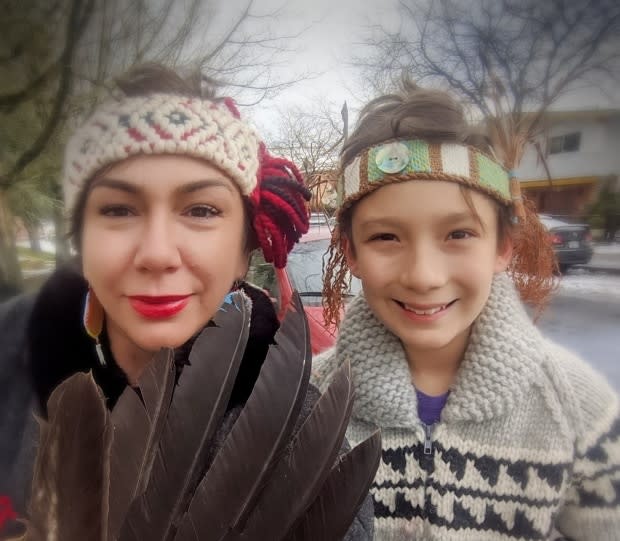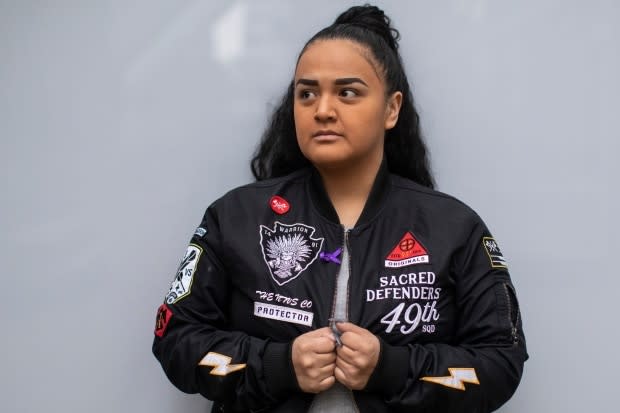Rise in anti-Indigenous racism and violence seen in wake of Wet'suwet'en protests
As protests in support of Wet'suwet'en hereditary leaders continue to sweep Canada, hate experts say anti-Indigenous racism and violence is on the rise and should be addressed.
There's a sea change at foot, with white supremacists and hate groups re-directing their attention to Indigenous people, says Evan Balgord of the Canadian Anti-Hate Network.
"So in the last two weeks or so, with the Wet'suwet'en crisis and with the solidarity demonstrations happening across Canada, we've seen a marked uptick in far-right activity," said Balgord.
He's tracked multiple social media posts calling for the murder or assault of demonstrators, with the primary targets both Indigenous people and their allies.
Balgord says race-based violence needs to be addressed by exposing those who commit it and he called on law enforcers to take a firmer line against those who threaten violence on social media.
It's not just protesters who have been the target of hate.

Wendy Nahanee was dropping her 14-year-old son Kiona off at school in Vancouver at 9 a.m. last Monday when the two faced a man yelling racist slurs at them.
"He said 'you stupid Indians, you hurt people and now you're going to get hurt,'" said Nahanee, who is of the Squamish Nation.
She believes she was a target because of her car, which is decked out in First Nations decals and motifs, and because she is visibly Indigenous.
The man continued to yell slurs and made a motion with his hand cutting his neck, then smashed a plastic wagon over her car for several minutes. Nahanee provided pictures and a phone number of a witness to the Vancouver Police department, which confirmed that a report was made. No charges have been laid.
'No one deserves to go through this'
Steven Norn was also the subject of what he says was anti-Indigenous violence on a Vancouver street.
The Dene artist, who looks visibly Indigenous, was waiting at an intersection on foot with groceries when out of the blue, a man sucker punched him, possibly with a weapon, yelling, "don't mess with the effing pipeline" as he fled the scene.
"He hit the right eye on my face, my glasses were completely destroyed and I have four stitches on top of my eyebrow and two at the bottom from the frames," Norn said.
"No one deserves to go through this," he added.
Balgord recommends naming those who post racial slurs or advocate violence on social media.
"On an individual and community level, I think we should be naming and shaming people who make racist posts so that there's social accountability leading to social pressure," he said.
He also added that people should demand law enforcement charge individuals who are threatening murder.
However, some say it's more complicated for Indigenous people.

White allies can help
Casey Edgar George is a Vancouver-based therapist of the Nuu-chah-nulth Nation who said she received more than 600 death threats and racist slurs after writing 'I really hope these land protectors are OK, sending love to all our protectors out there," on an Instagram post of a video of a truck running through a bunch of protesters.
"Some were asking me if I forgot to drink my hand sanitizer today and others telling me to end my life," she said.
But she doesn't believe in publicly shaming racists and also doesn't feel confident in the role of police to take crime toward Indigenous people seriously.
Rather, she feels it's important for white allies to speak up for Indigenous people when they witness racism, especially online where most of the vitriol exists.
She encourages people not to read the comment sections of news stories about Indigenous people.
"Look to our ancestors for strength and to our future generations for hope, not at the comments used to suppress the power others know we have," she said.
Hate crimes often not reported
Vancouver police have verified both Steven and Wendy's reports but says VPD Hate Crimes investigators have not noticed a spike in hate-related incidents over the past two weeks.
Spokesperson Sgt. Aaron Roed says hate crimes and incidents have always been significantly under-reported.
But Balgord says people shouldn't be overly alarmed.
"I think [anti-Indigenous racism] is something that we should all be taking a look at, but I wouldn't want to portray that as if people are at an imminent risk of dying," Balgord said.

